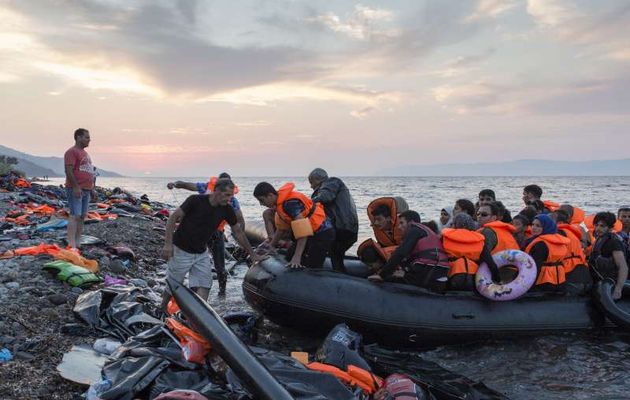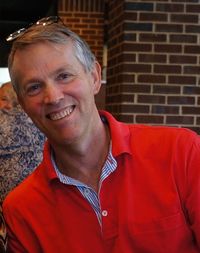“The best way we can engage with refugees is to join with them”
A new edition of the RHP roundtables will take place in Budapest on February. Paul Sydnor, one of the organisers, talks about the event and the current situation of refugees worldwide.
BUDAPEST · 26 JANUARY 2017 · 15:10 CET

For the fourteenth year in a row, the Refugee Highway Partnership (RHP) roundtables will gather churches, mission leaders and refugee workers across Europe, to share resources, best practices and practical ideas for ministering to refugees.
“The RHP is important and unique because of its international nature and its vision to connect groups together across the region and globally”, Paul Sydnor, one of the organisers, told Evangelical Focus.
The four days in Budapest (February 6-10), will be full of ministry planning, including 25 workshops on special issues, times of prayer, daily plenaries, testimonies (former refugees will share their perspective) and networking.
About 150 people have registered, coming from 16 countries and representing 50 different organisations.

“WE NEED EACH OTHER”
Paul Sydnor serves on the RHP leadership team for the Europe region, and he is the European Director for the International Association for Refugees, which is based in Lille, France.
He believes that “refugee issues are too complex and large for any one group to address alone. We need each other and we need to work and think internationally.”
Specially now, “the need to stay connected has become even more important in the current political climate”, because “the command to love and welcome the stranger, as well as God's mission to include the nations, does not go away just because there are populist groups who want to emphasize their own national identity and values.”
“REFUGEES ARE ON A FAITH JOURNEY AS MUCH AS ANY OTHER”

“Like any journey, they stop to ask where am I and who am I? When this happens and when they connect their journey to God's journey in the scriptures, then changes happen”, he concludes.
You can read the whole interview below.
Question.This year is the 14th edition of the Refugee Highway Partnership roundtables, do you still have the same vision and aims? How have you adapted your work to the current situation of refugees in Europe?
Answer. The RHP is a movement, whose purpose has always been to share learning, encouragement, resources and networks. We are a network and not an organization. People who take part also work in other organizations and ministries.
The RHP has focused on doing three things over the years: to promote the World Refugee Sunday (this year on June 11th and 18th ); to offer an annual roundtable gathering and to give regular updates about issues for prayer and other needs. This is still our vision and aim.
The recent crisis and the continued influx of arrivals in Europe shows us that refugee issues are too complex and large for any one group to address alone. We need each other and we need to work and think internationally.
The RHP is important and unique because of its international nature and its vision to connect groups together across the region and globally. We want to strengthen this aspect. Already we have teamed up with the EEA to make more resources available, and we are looking at still more ways to increase our reach.
We want to build our connection across borders as well as the connection between refugees and Europeans. The need to stay connected has become even more important in the current political climate. We want to adapt the network to bring more connection among each other, as well as with refugee and ethnic groups. God is using all of us to build his Kingdom.
Q. There will be churches, mission leaders and refugee workers in the roundtables in Budapest next February, what will they find during this conference?
A. Several local pastors or ministry leaders from Eastern Europe and the Balkans will share each morning from their experience. We will hear short reports and testimonies from others including refugees. Patrick Johnstone will lead three plenary sessions.
There will be regional discussion groups as well as panel discussions in the evening.
As always, the participants themselves make the largest contribution. This is their network, and twenty of the participants will offer workshops on practical ministry topics. As well, the participants will set up a large resource table to show what they are using in ministry.
Q. The rise of populism in Europe is a reality. How does it affect the situation of refugees and asylum seekers?
A. The rise in populism will likely mean there will be more half-truths that misrepresent the issues and that the refugees and asylum seekers themselves will be pushed further under the radar.
The command to love and welcome the stranger, as well as God's mission to include the nations does not go away just because there are populist groups who want to emphasize their own national identity and values.
As a network, the RHP should emphasize its focus on Christian values that are at the heart of Europe and our concern for refugees and asylum seekers to understand and embrace these.
Q. Around 65 million people were displaced worldwide in 2016, thousands of them in Europe. Are European Christians aware of this? Are we ready to give answers to their material and spiritual needs?
A. I think the best way we can engage with this flood of people is to join with them. We need to find ways to empower them to address the issues and to find the answers in ways they can understand and that respect the local context where they move to.
Q. As Christians and local churches, what can we do in our everyday life to help those refugees?
A. You can:
- Inform ourselves about what the reality is in our local area.
- Find out where asylum seekers and refugees may be living.
- Get to know them and visit them.
- Ask how you can help them, and ask if they want to help you in some way.
Q. There are many stories, throughout Europe, of refugees who become Christians in the cities where they arrive. Why is that happening?
A. Refugees are on a faith journey as much as any other, and a small portion of refugees recognize this. Like any journey, they stop to ask where am I and who am I? When this happens and when they connect their journey to God's journey in the scriptures, then changes happen.
Published in: Evangelical Focus - europe - “The best way we can engage with refugees is to join with them”
